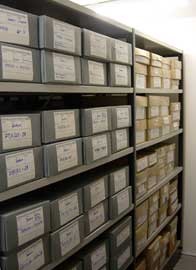The Mission Statement from our recent chapter, ‘In the Spirit of the Constitutions we choose again to live our Mercy Mission in every encounter,’ so simple and so perfect, came back to me as I began to write. I have worked in South Central Provincial Archives, in Booterstown, Dublin, for the last fifteen years recording and preserving our Mercy story. The documents which are archived are multi-faceted, and yet the Mission Statement fits, because our lives and our endeavours, recorded since 1831, are full of the small encounters which fill our days and which we hope are permeated with Mercy. And the archival material records a picture of our day – to – day lives, down through the years.

The work in South Central Archives is very varied. We are linked at all times with the Congregational Archives in Herbert Street in Dublin. In recent years several houses, convents and ministries have closed and documents considered archival come to the Archives. They are appraised, listed and stored in archival boxes, contributing to our identity and our history and often they also tell of development in the wider society and the part we have played. The boxes are kept in a special storage room which has an air conditioning unit to keep the temperature at the correct level for the preservation of the paper. There are guidelines and retention schedules which must be followed, especially for legal and financial data. It is important to keep safely all material connected to property – maps, plans, leases, legal documents, sales, agreements. These may be necessary for the sale or transfer of property. The retention of employee records is required. Keeping of accounts is very important too. The minute books of community meetings, and of leadership team meetings, are good to have; through the discussions and decisions taken they show how religious life develops and the philosophies and spiritualities of different eras which bring changes that we now take for granted.
Much of our time is spent dealing with queries which come in. Researching family history has become very popular and there are many requests for information about relatives who became Sisters of Mercy. Sometimes we have very little to tell, especially pre-1994; then when the provinces came into being, the archives and the collecting of material became more active. Interest in academic research around the phenomenon of religious life in Ireland is growing and several of the orders are writing their stories. Our archives offer insights into aspects of Irish life which are not available elsewhere because our work in the building up of education, health and social care since the nineteenth century means that our records are very significant in the narrative of the wider Irish society. And there are still queries connected with our industrial schools. The archives were also involved when there were national enquiries, like the McAleese Report, or the recent workhouse inquiry concerning the women who gave birth in them.
We have also taken on some special projects. Artefacts connected to Mercy life in all the houses of the Congregation have been photographed, described and provenance established where possible, and all put on a spread sheet. The headstone of every Sister who has died in the Congregation is being photographed at the present time and listed, whether in our own cemeteries, with family, or in any other place. We have researched the burial place of each of our Sisters who have died, over the years, in the Catholic Mental Institution in Bruges, Belgium. The graves there are recycled, without headstones, and plaques remembering the Sisters have been put in our cemeteries. With a great deal of correspondence and communication we found their registration of burial in the city’s registration records. With one Sister we could not establish if she had returned to Ireland or where she had been buried, until unexpectedly, a one-line entry in an old account book showed that money had been sent for her coffin and her funeral. In recent times thirty six people, Sisters who from the 1970’s on, moved from traditional convents to live in houses in local housing estates, and some of the people with whom they shared life, have been interviewed and the transcripts are available. Through their telling of their stories we have testimonies that the official documents could never reveal.
While the ‘official’ archival documents are necessary and important they can be supplemented with material through which we can see the personal journeys and the human faces of Sisters as they travel their own individual paths in Mercy. This is always amazing; so many have given so much, often in quiet and ordinary ways. With the success of the recent film from John McGahern’s book, ‘That They May Face the Rising Sun,’ one of his quotes has come to the fore, ‘The best of life is lived quietly, where nothing happens but our calm journey through the day, where change is imperceptible and the precious life is everything.’ I think this can be said about most of our lives. In the archives we can see this from the annals of the houses, often the day-to-day simplicity of living, showing glimpses of kindness and welcome and generosity in our encounters. The yearly annals are eventually bound into beautiful books and to pick one up and look through it brings many surprises, ‘Did that really happen?’ ‘I don’t remember that.’ It is the level of detail that makes an account so memorable. Annals place our lives in the framework of the time. Today there are many new ministries; these need to be recorded too.
During COVID several Sisters wrote their own personal stories, again, they can fill the reader with wonder. Sometimes when a house closes the last Sisters write ‘memoirs’ or write the story of the house, or we receive cuttings from local newspapers. Through these, the Mercy story in convents in small places around Ireland is told – the struggle of beginnings, the effort to meet a local need, overcoming the difficulties, becoming inserted in the community, setting up new ministries in more recent times.
Personal papers of Sisters are collected, organised and stored. We get further glimpses of the lives of each Sister, perhaps names of siblings, photographs, an occasional long-kept letter, certificates, personal writings, descriptions of ministry, significant events and participation in the parish. When each Sister dies we write an obituary, longer than the death notice, so more research is involved. Our Personal Profiles are very helpful providing the places where we have lived and ministered. Through the obituaries we honour each Sister, not just for her work but also for her intrinsic value, her uniqueness. ‘I thank You for the wonder of my being.’ The condolence messages now put on the RIP.ie website are often so interesting; they can tell the story of a life. They can become part of the obituary.
So – why Archives? Can we expect others to remember the Sisters of Mercy if we ourselves leave no record behind? The archives are treasure troves, a testament to many lives lived and the complexity of an organisation as it moves forward. They help us to know and understand ourselves. They are our gift to coming generations. And they are the story of the Mercy faith journey.
Sr. Mary Coyle
Provincial Archivist
South Central Province




